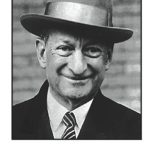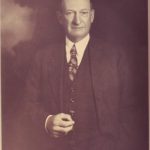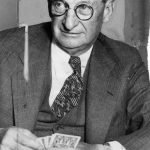Plain Dealer magazine article written by Brent Larkin in May, 1991 about Cleveland’s political bosses
The link is here
THE POWER BROKERS GLORY DAYS OF POLITICAL BOSSES
By Brent Larkin
Compared to “The Red Boss,” they were pikers, all of them. The men of Tammany Hall? Big deal. They only ran New York City. Richard Daley? Come on. His power died at the Chicago city limits.
Cleveland has had its share of powerful political bosses, men like Maurice Maschke, Ray T. Miller, Albert Porter and, for a time, Robert E. Hughes. But, in terms of power, prestige and cunning, none could hold a candle to Marcus Alonzo Hanna. “The Red Boss” got his name because Cleveland’s skies turned that color after the smoke spewed from M.A. Hanna & Co. factories. “The Red Boss” got his power because of green, as in the millions earned from the country’s most successful coal and ore mining firm. Political bosses have used their clout to make mayors, county commissioners, judges, even governors and senators. Hanna used his to make a president. He single-handedly engineered the election of a president of the United States.
“Dollar Mark,” as he was also known, was born in Lisbon, near Youngstown, in 1837. His father was a doctor who was often in ill health. In 1852, the family moved to Cleveland, where his father abandoned his medical practice and opened a grocery store. After serving briefly in the Civil War, Hanna returned home to work in the family business. He invested in oil wells, steamships and mines. Under Hanna’s leadership, the M.A. Hanna & Co. became an industrial giant. Hanna first entered politics in 1880, when he formed the Cleveland Business Men’s Marching Club. The only place these men marched was to the bank, to make large deposits. It was around this time that Hanna met and befriended William McKinley, a Canton lawyer who journalist William Allan White would later describe as “on the whole dumb and rarely reaching above the least common denominator of the popular intelligence.”
McKinley’s shortcomings aside, he was on his way. And Hanna would serve as his tour guide to the top. First, Hanna engineered McKinley’s election as governor, but that was merely a steppingstone. What Hanna wanted was the 1896 Republican nomination for president. In pursuit of that goal, the onetime Cleveland grocer pulled out all the stops. He resigned from his company in order to devote all his time to the campaign. Figuring McKinley needed a friendly newspaper, he bought one – the Cleveland Herald. He traveled the country organizing McKinley clubs and securing contributions. More than $100,000 – an astronomical figure at the time – was spent to win McKinley the nomination.
By June 1896, when Republicans convened in St. Louis, McKinley’s nomination was assured. In his book, “The President Makers,” Francis Russell described the scene on the convention floor. “After the applause and the demonstrations following McKinley’s overwhelming nomination of the first ballot, there were cries of Hanna! Hanna! from all over the convention floor. … It was his moment of triumph. A huge crowd met him at the Cleveland railroad station on his return, drowned out his stammered thanks with their cheers, and escorted his carriage home.” But Hanna knew there was work to be done. Ahead was a campaign against Democrat William Jennings Bryan, an eloquent speechmaker capable of taking advantage of the country’s anti-business mood.
After the convention Hanna was made chairman of the Republican National Committee. In past presidential campaigns candidates would usually raise between $1 million and $2 million. Hanna raised an estimated $7 million, which enabled him to flood the nation with McKinley campaign literature and other propaganda. That was only half of Hanna’s strategy. The other half involved avoiding comparisons between the charismatic Bryan, with his moving “Cross of Gold” speech, and the dull McKinley. Toward that end, Hanna had McKinley stay home, literally. While Bryan dashed across the country, McKinley campaigned from his front porch in Canton. Groups of reporters and representatives of large voting blocs were brought to McKinley’s home and given rehearsed speeches. It was an early day version of the “Rose Garden strategy.” And it worked.
By election day, Hanna’s national organization was an efficient machine. Blacks were brought by trains from the South to northern states that needed Republican votes. Out West, one district counted 48,000 votes, 18,000 votes more than people registered. McKinley won in a walk. Hanna was the forerunner of the modern-day boss. As Russell wrote, “All subsequent American political campaigns have, for better or worse, followed the model established by the Red Boss in 1896.” Hanna followed McKinley to Washington by engineering his election to the
U.S. Senate. In those days, senators were elected by the state legislature. Hanna won by only one vote, amid charges of bribery and threats. To no one’s surprise, Hanna wielded immense power in Washington. Political cartoonists frequently depicted the president as a puppet, with Hanna pulling his strings. Still, there was never any indication McKinley resented Hanna, as the two remained fast friends and inseparable allies.
In 1990, McKinley again ran against Bryan and won handily. But Hanna was dealt a rare setback when he failed to stop the nomination of Teddy Roosevelt as vice president. The two disliked each other. Roosevelt once remarked, “I think there is only one thing I do not understand, and that is Ohio politics.”
Despite the elevation of Roosevelt to the vice presidency, there was little doubt that McKinley wanted Hanna to succeed him in the Oval Office and that Hanna planned to make such a run. But all that changed on September 6, 1901. While making a speech in Buffalo, McKinley was shot twice by a young man from Cleveland named Leon Czolgosz. The president survived only a few days. Roosevelt became president. When McKinley died, Hanna’s dream died with him.
Curiously, Hanna’s vast political power at the national level produced mixed results back home. Hanna retained control of the local Republican organization, but he could not prevent his nemesis, Tom L. Johnson, from winning four terms as mayor. Despite urgings from Wall Street, Hanna did not challenge Roosevelt in 1904. He realized the new president had become too popular. Described by many as a broken man, Hanna was re-elected to the Senate in 1903 and soon took ill. He died on February 15, 1904.
“He was the first national boss,” says Cleveland State University history professor Thomas Campbell. “He was truly a remarkable figure. I would say he was, beyond a doubt, the most powerful politician the country had seen up to that point.”
While Hanna was the most powerful political boss the nation had seen, Maurice Maschke was the most powerful political boss Cleveland had seen. As GOP chairman for 20 years and an influential figure for 35 years, Maschke dominated local politics. The Harvard-educated Maschke began to dabble in politics in 1897, but his rise through the ranks was meteoric. By 1900, he was the boss of eight city wards, including downtown. By 1904, he had the reputation of the city’s most astute political operative. And, by 1909, Maschke had performed the impossible: He had defeated Johnson, the most revered mayor in the city’s history.
As the 1909 mayoral election neared, most Republicans favored conceding re-election to Johnson by not even fielding a candidate. Maschke told them he not only had a candidate, he had a winner. It was Herman C. Baehr, the county recorder. Maschke took the inarticulate Baehr and carefully choreographed his campaign, limiting the candidate to three-minute prepared speeches.
“Baehr will win,” insisted Maschke. “Johnson has been mayor for eight years. That’s too long.”
Johnson didn’t seem to take his opponent seriously. He stopped campaigning three days before the election, traditionally the critical days in a political contest, and actually left town. Baehr won handily.
By 1914, Maschke was in complete charge of GOP politics. He controlled City Council and was a key figure in Herbert Hoover’s successful 1928 presidential campaign. He persuaded council to name William R. Hopkins as city manager and, when Hopkins began to challenge Maschke, he had council remove him from office.
As a lawyer and owner of a title company, Maschke was a wealthy man. Although editorial pages usually denounced him as a dictatorial boss, reporters revered him for the insights and news tips he regularly provided. Only once was Maschke tainted by scandal. He was one of many Republicans indicted during a 1932 probe of the county treasurer’s office, but was unanimously acquitted by a three-judge panel. Maschke’s demise started in 1928, when Democrat Ray T. Miller won the office that all political machines viewed as essential – county prosecutor. A year later, when the Depression rocked the nation, Republicans began to lose their grip on city voters.
His power diminished, Maschke resigned as GOP chairman in 1933 and died three years later.
“The remarkable thing about Maschke was he was so brilliant,” says Campbell. “He wasn’t the typical boss with a cigar in his mouth. The coalition he put together that defeated Tom L. Johnson was brilliant politics.”
When the Depression began to tilt the balance of power to the Democrats, Ray T. Miller was ready. He had studied Maschke’s machine politics. He understood the importance of the black vote, of forging coalitions among ethnic voters. He was ahead of his time in courting the women’s vote.
“Women’s involvement was the most important thing that ever happened to American politics,” Miller once said. “Women formed the greatest part of the workmanship where it counted, in the wards.” In 1931, Miller moved from the prosecutor’s office to the mayor’s office. As mayor, he began construction of the Memorial Shoreway and finished building the lakefront Stadium. But the Depression forced Miller to make deep cuts in city services, and he lost his re-election bid. Defeated in another try for mayor in 1935, Miller thought he was finished with politics. Truth was, he was just beginning.
In 1940, Miller toppled veteran Democratic chairman W.B. Gongwer from his post. Miller would hold the job for 23 years. As chairman, Miller became a favorite of the Roosevelt White House. He amassed a small fortune as a lawyer and owner of radio station WERE. Miller was to make one more attempt at elected office but was crushed by incumbent Gov. Frank Lausche in the 1948 gubernatorial primary election.
In 1960, Miller became the first big-city chairman to endorse the presidential candidacy of John F. Kennedy. The young candidate’s speech at Euclid Beach Park that year is still remembered for the estimated 100,000 who filled the park. Following the election, Miller was granted easy access to the Kennedy White House.
By 1963, Miller was in his 12th term as chairman, but his influence was waning. He had a falling out with Mayor Ralph Locher, and the enemies Miller had made over the years were calling for his ouster. At first, Miller refused, but in 1964, he surprisingly stepped aside. Two years later, Miller died of a heart attack at his Shaker Heights home. He was 73.
Miller wasn’t the last of Cleveland’s powerful political bosses. Albert Porter had power – and abused it (see box, page 23). Then there was Robert E. Hughes, who until his recent resignation served as chairman of the county’s Republican organization for more than 22 years. Operating on a political terrain where Democrats outnumber Republicans by more than a 3-1 ratio, there was a period, especially in the 1970s, when Hughes enjoyed astounding success.
For all but two years from 1971 through 1989, a Republican occupied the mayor’s office, and there was a time when the GOP controlled both the county commission and the auditor’s office. Quite often, Hughes remained one step ahead of local Democratic leaders, sometimes acting when Democrats were merely talking.
In no case was that more evident than Hughes’ key role in promoting Virgil Brown as the first black to hold a countywide, non-judicial office. For more than a decade, Brown held a county commission seat. He turned back challenges from two of the county’s most prominent Democrats – Timothy F. Hagan and Benny Bonanno.
Hughes’ power ebbed considerably during the 1980s, as the party failed to field candidates for many local offices and found itself deeply in debt. The GOP head also found himself in the midst of several controversies and a major criminal investigation that resulted in no charges. Still, Hughes will be remembered as a chairman who, during his heyday, overcame long odds to engineer Republican victories in campaigns, which, on paper, they had no business winning.
While Hughes was once an effective leader, he was not a “boss” in the Hanna sense. Greater Cleveland’s last political boss was probably Ray T. Miller. Gradually, grass-roots politics gave way to TV politics, where candidates rise or fall based on 30-second advertisements.
Today, Cleveland has no bosses. Local political parties have leaders, but the clout and prestige of those leaders is a far cry from when “The Red Boss” single-handedly engineered the election of a president.
Brent Larkin, a former Plain Dealer political reporter and columnist, is director of the editorial page.



